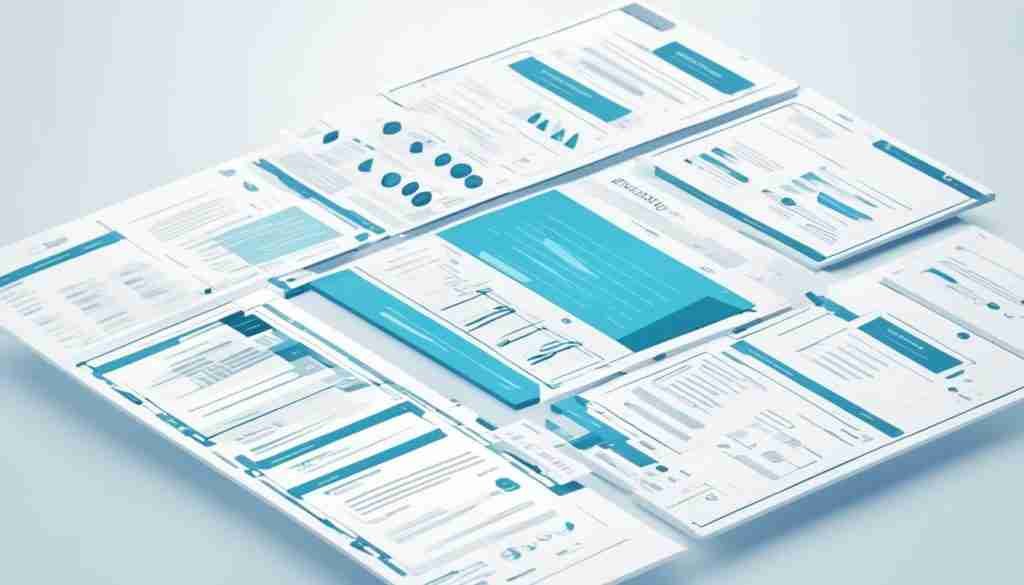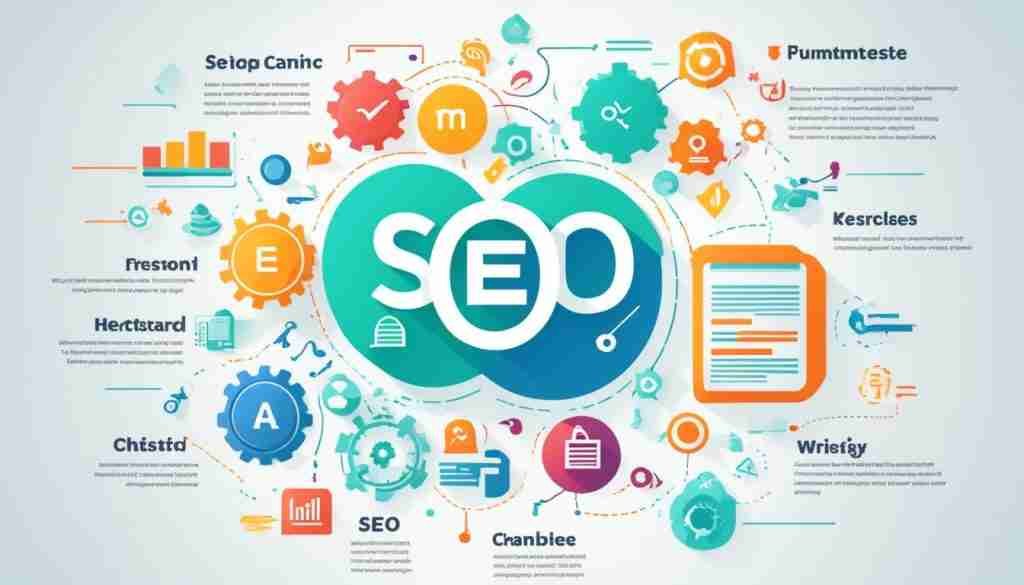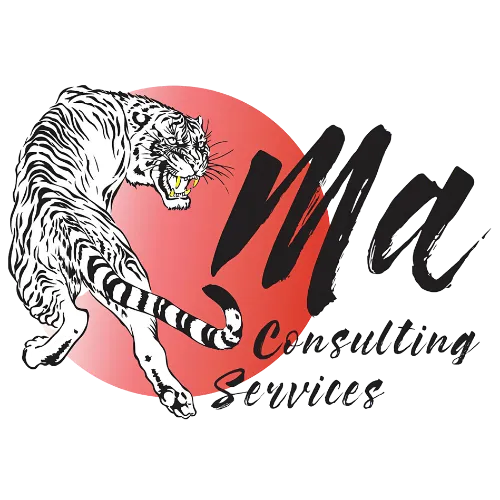
Did you know on-page SEO can boost your website’s organic traffic by 40%? This technique is key to climbing up the Google ranks and drawing in more customers. By getting good at on-page SEO, you can lead your online game and beat your rivals.
On-page SEO, also known as on-site SEO, makes your webpages better for search engines and users. It helps your pages rank higher on Google and brings in more visitors. You’ll work on making your site match search intent, tweak title tags, set up internal links, and refine URLs.
On-page SEO can open the door to a flood of new visitors and customers. It’s all in your hands: You pick the page’s topic, audience, and the keywords you aim for.
Key Takeaways
- On-page SEO makes webpages better for search engines and users.
- Key tasks include optimizing for search intent, title tags, internal links, and URLs.
- Search engines like Google put a lot of stock in on-page SEO signals for rankings.
- Choosing the right keywords and doing keyword research is key for on-page success.
- Improving HTML elements like headings, URLs, and meta tags can really help your site stand out and rank better.
On-Page SEO Basics and Overview
Definition of On-Page SEO
On-page SEO, also known as on-site SEO, is about making changes to your website’s pages to boost their search engine ranking. It focuses on optimizing different parts of your site, like content, structure, and HTML code. This makes it easier for search engines to understand and rank your website.
Importance of On-Page SEO
On-page SEO is key to doing well in search engine optimization (SEO). It helps your site rank higher, get more organic traffic, and increase conversions and revenue. By making your website better in terms of content, structure, and technical aspects, you tell search engines it’s valuable and relevant. This leads to better visibility and higher rankings.
Good on-page SEO includes things like keyword research, high-quality content, and optimizing images. It also involves using title tags, headings, meta descriptions, URLs, and internal links. By focusing on these, you can make your website more appealing to search engines and your audience.
On-page SEO is part of a bigger SEO picture, along with off-page SEO and technical SEO. By covering all three, you can create a strong SEO strategy. This will help your website succeed in the long run.

“On-page SEO is crucial for search engine optimization (SEO) success, as it helps your website rank higher in search results, attract more organic traffic, and ultimately, drive more conversions and revenue.”
Key Elements of On-Page SEO
Improving your website for on-page SEO means focusing on key elements. These elements can greatly affect your visibility and rankings on search engines. By mastering content optimization, HTML structure, and site architecture, you can beat your competitors and connect better with your audience.
Content Optimization
Creating high-quality content that meets your readers’ needs is key. Start by doing keyword research to find the best topics and keywords. Use these keywords in your content but don’t overdo it. Make sure your content answers questions, offers new insights, and includes images or videos.
Studies show that title tags are very important for SEO, after content. Make sure your page has the target keyword in the title, URL, and image alt text. Writing unique, keyword-rich meta descriptions can also increase your clicks.
HTML Elements
HTML elements in your website’s code help search engines understand and index your content. This includes things like page titles, headers (heading tags), meta descriptions, and structured markup. Optimizing these elements can make your site better for users and give search engines important context.
Site Architecture
Your website’s structure affects its SEO performance. Things like page URLs, internal linking, mobile responsiveness, and site speed impact the user experience and how easily search engines can crawl your site. A well-organized site makes it easier for search engines to find and index your content, which can lead to better visibility and rankings.
By focusing on these on-page SEO elements, you can make your website more attractive to qualified traffic. This can help you engage your audience and drive better results for your business. Tools like Ma Consulting Services can offer insights and steps to improve your on-page SEO strategy.

“Unique content that provides value and is optimized for search intent is crucial for top rankings in 2024.”
What is On Page SEO?
On-page SEO, also known as on-site SEO, is about making your webpages better for search engines. It involves optimizing elements on your website’s front-end and back-end. This includes content optimization, keyword research, site structure, meta tags, heading tags, image optimization, and page speed.
The main aim of on-page SEO is to help search engines like Google understand and index your webpages better. It also aims to give users a smooth and valuable experience. By optimizing your website, you can make it more visible and relevant in search results. This leads to more qualified leads and conversions for your business.
Some key on-page SEO factors to consider include:
- Keyword-rich and user-friendly content
- Optimized title tags, meta descriptions, and headers
- Effective internal linking structure
- Optimized images and multimedia elements
- Fast page load times and mobile-friendliness
- Structured data and schema markup
Mastering on-page SEO is an ongoing task. It requires regular review, testing, and refinement. By keeping up with the latest best practices and optimizing your website, you can boost your search engine visibility. This helps drive more qualified traffic to your Maconsultingservices.site or Ma Consulting Services.
“On-page SEO is the foundation of a successful search engine optimization strategy. By optimizing the content and structure of your website, you can significantly improve your chances of ranking higher in search results and attracting the right audience.”
Remember, effective on-page SEO is not just a one-time task. It’s an ongoing process that needs continuous monitoring, analysis, and optimization. By staying ahead and adapting to search engine changes, you can position your website for long-term success online.
Conclusion
On-page SEO is key to a strong digital marketing plan. It helps make your website more visible in search engines. This leads to more visitors who are really interested in what you offer. By focusing on quality content, optimizing HTML, and improving site structure, you can boost your site’s performance.
Starting with keyword research is important. Then, make sure your meta tags and heading tags are optimized. A strong on-page SEO plan can help your site stand out online. Also, having a mobile-friendly site and fast page speed are key for a good user experience and better search rankings.
Using on-page SEO can set your website up for long-term success. Keep up with the latest SEO trends and practices. This will help you stay ahead and make your Maconsultingservices.site or Ma Consulting Services more visible.
FAQ
What is on-page SEO?
Why is on-page SEO important?
What are the key elements of on-page SEO?
How does on-page SEO help drive traffic to my website?
What are some common on-page SEO best practices?
Source Links
- On-Page SEO: What It Is and How to Do It – https://www.semrush.com/blog/on-page-seo/
- The Ultimate Guide to On-Page SEO in 2024 – https://blog.hubspot.com/blog/tabid/6307/bid/33655/a-step-by-step-guide-to-flawless-on-page-seo-free-template.aspx
- What Is On-Page SEO? – https://www.webfx.com/seo/glossary/what-is-on-page-seo/
- On-Page SEO: The Complete Guide for 2024 – WordStream – https://www.wordstream.com/blog/ws/2022/04/06/on-page-seo
- On-Page SEO: How to Optimize for Robots and Readers – https://ahrefs.com/blog/on-page-seo/
- On-Page SEO: Big Guide to On-Site Optimization (2022) – https://terakeet.com/blog/on-page-seo/
- What Are On-Page Ranking Factors For SEO? – https://moz.com/learn/seo/on-page-factors
- On-Page SEO: The Definitive Guide + FREE Template (2024) – https://backlinko.com/on-page-seo
- On-Page SEO: The Complete Guide for 2024 – https://www.linkedin.com/pulse/on-page-seo-complete-guide-2024-m-a-mamun-ppiec
- The Complete Guide to On-Page SEO – https://www.searchenginejournal.com/on-page-seo/
- What Is On-Site SEO? How To Optimize A Page – https://moz.com/learn/seo/on-site-seo
- What is on-page SEO? – https://yoast.com/what-is-onpage-seo/
- Importance of On-Page SEO – https://www.linkedin.com/pulse/importance-on-page-seo-kaleem-doctor-of-pharmacy-pharm-d-2nd-year
- On Page SEO Optimization | Definition, Importance and Strategies – https://www.geeksforgeeks.org/on-page-seo-optimization/
- What is On-Page SEO? How to Optimise Your Website in 2024 – https://localiq.co.uk/blog/what-is-on-page-seo-and-why-is-it-important-for-business




